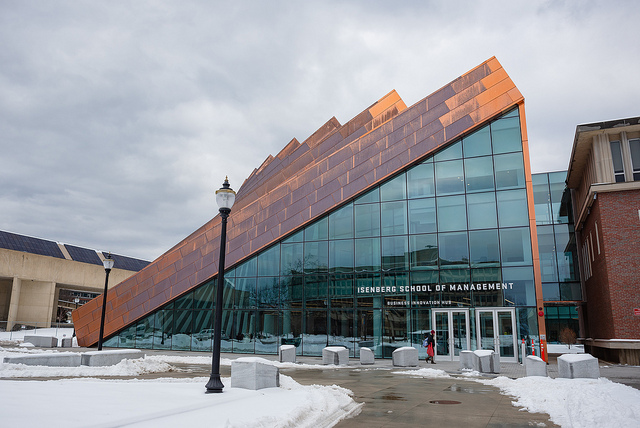Four speakers have been announced for the TEDxAmherst’s “Solve for (Wh)y” event on April 7, leaving eight more to be revealed in the upcoming weeks. The student-run program will be held in the Isenberg Business Innovation Hub at the University of Massachusetts from 10 a.m. to 5 p.m.
Jim Flynn, founder of pioneering tech companies and co-founder of the Kuwa Foundation; Kelsey Nass, a BDIC sophomore and president of the UMass Sigma Delta Tau chapter; Bob Lowry, founder and CEO of Bueno Y Sano and Alice Flaherty, author and associate professor of neurology and psychiatry at Harvard University are among the first speakers to be shared via the TEDxAmherst’s Facebook page.
Early bird tickets for the event went on sale at 8 a.m. on March 1 and sold out of their 100 tickets within four hours. The remaining 300 tickets will be available for purchase on March 22 for $35 each, $25 for students.
According to the Eventbrite, “100 percent of all ticket sales are invested into producing the event and the TEDx talk videos that help spread our featured ideas beyond Western Massachusetts (the entire team and all speakers are volunteers).”
Ruby Ramsay, executive director of TEDxAmherst and computer science sophomore, explained how the day will consist of three blocks of four talks each with networking opportunities in between. Lunch by UMass Dining will be provided before breakout workshop sessions. Some of these optional sessions will be led by the speakers, based on their hobbies.
Free TEDxAmherst merchandise will be given out to all attendees when they collect their name badge at the start of the event.
When explaining the theme’s event, Ramsay said, “It’s intentionally meant to be broad… TED is known to be interdisciplinary, I mean, we have topics spanning from education to sexual assault to technology and emerging technology like blockchain and entrepreneurial ideas and then more concept-based things that can be applied to anyone’s life.”
Through the curated speakers, Ramsay hopes to explore questions such as “Why do we do things the way we do? Why should we adopt this idea? Why are things the way they are? Why will things be the way they will?”
Three to four people a day have been reaching out to Ramsay with suggestions for talks and she has received over 200 speaker applications.
In 2013 and 2014, TEDxUMassAmherst hosted events and 2015 saw TEDxAmherst’s “Pioneer” program. Last year, Ramsay, as a freshman, decided to start up TEDxAmherst again and applied for a city TEDx license (which is technically not affiliated with TED).
Because the license is for the town of Amherst, the team has been trying to incorporate the Five Colleges as much as possible. Currently, they have at least one faculty or staff member from each college.
Flynn, the first speaker released, found out about the event early on from a colleague at the UMass College of Information and Computer Sciences and contacted Ramsay, who was a “one-person show at the time.”
Now, a year later, Flynn is watching lots of TED Talks and studying the format for his own presentation. Over the next month he hopes to practice his presentation on privacy and online identity and receive feedback.
“I think people don’t think about identities and privacy, but I think it’s really important to raise the awareness of it,” Flynn said. “We are being molded by the amount of information that companies are keeping on us and how they are using it and harvesting it. It’s moving away from just collecting information to make more relevant ads and morphing into turning people to the commercial or even political outcome that they want.”
“I think it’s really important for the future democratic societies that people understand privacy issues.”
Abigail Charpentier can be reached at [email protected] and followed on Twitter @abigailcharp.




















